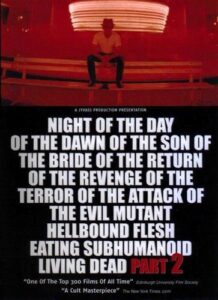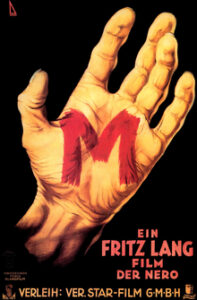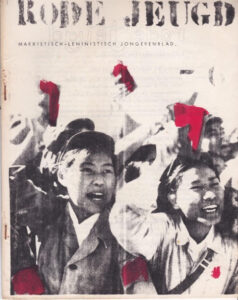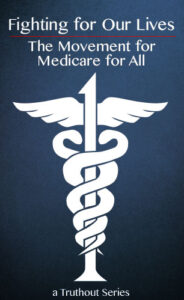Wat is lang? Een onderzoek naar lange filmtitels
 Ach, wat is lang? Dat is relatief.
Ach, wat is lang? Dat is relatief.
Night of the day of the dawn of the son of the bride of the return of the revenge of the terror of the attack of the evil, mutant, crawling, alien, flesh-eating, hellbound, subhumanoid , zombiefied living dead part 2: in shocking 2-D (2011), bijvoorbeeld, wordt met zijn 40 woorden in vakkringen beschouwd als langste filmtitel.
Het is een parodie op The night of the living dead (1968), de titel van de film waarmee George A. Romero zijn regiedebuut maakte met een budget van slechts $ 150.000,-, een film die nog altijd een van de best gewaardeerde griezelfilms is.
De grap is dat in die ellenlange titel de namen van tal van andere films zijn verwerkt. Om te beginnen die van Romero, maar voorts ook bijvoorbeeld The revenge of the dead (1960), The bride of the monster (1955) of The attack of the killer-tomatoes (1980). Om een idee te geven. En er wordt ook nog een lijst met cliché-monsters bij geleverd, van mutant tot flesh-eating aan toe.
Als uitgangspunt voor hun selectie beperkten de vakkringen zich tot speelfilms – dus geen documentair of educatief werk – van Engelstalige – lees: Amerikaanse – makelij. Niet dat in het Frans – Chacun son cinéma ou Ce petit coup au coeur quand la lumière s’éteint et que le film commence (2007, 18 woorden) -, Duits – Die Antigone des Sophokles nach der Hölderlinschen Übertragung für die Bühne bearbeitet von Brecht 1948 (Suhrkamp Verlag) (1992, 17 woorden) -, Spaans – Mil nubes de paz cercan el cielo, amor, jamás acabarás de ser amor (2003, 13 wooorden) – of Italiaans – Film d’amore e d’anarchia, ovvero ‘stamattina alle 10 in via dei Fiori nella nota casa di tolleranza… (1973, 17 woorden) – geen lange titels bestaan, maar Amerika ziet zichzelf graag als het centrum van de cinematografische industrie en dat is, eerlijk gezegd, niet eens helemaal ten onrechte.
Pseudo-humor
Mocht u niettemin de indruk hebben dat overdreven lange titels zich bij uitstek lenen voor slechte horror – Oh Snap! I’m trapped in the house with a crazy lunatic serial killer! (2008, 13 woorden) – of voor de pseudo-humor van films op het bedenkelijke niveau van I could never have sex with any man who has so little regard for my husband (1973, 16 woorden), dan wordt het tegendeel bewezen door de verfilming van The Persecution and Assassination of Jean-Paul Marat as Performed by the Inmates of the Asylum at Charenton Under the Direction of the Marquis de Sade (1967, 25 woorden). Die is gebaseerd op Marat/Sade, het van oorsprong Duitse toneelstuk van Peter Weiss, zoals gespeeld door de Royal Shakespeare Company. Het geheel draait om een toneelstuk – de moord op de Franse filosoof Marat – in de versie van de bewoners van het krankzinnigeninstituut Asile de Charenton in Noord-Frankrijk onder de regie van Marquis de Sade, die daar zelf lang heeft verbleven en er ook zou sterven.
 Kort
Kort
De vraag naar de langste titel brengt automatisch ook de zoektocht naar de kortste mee. Om die eer strijden drie films, een Amerikaanse en twee Europese. Q (1982) heette oorspronkelijk The winged serpent, De gevleugelde slang, en dat zou al genoeg moeten zeggen. Een prehistorisch Azteeks afgodsbeeld komt tot leven in zijn nest bovenop een New Yorkse wolkenkrabber en zaait dood en verderf onder de betere kringen in Manhattan.
M (1931) van regisseur Fritz Lang is, in contrastrijk zwart-wit gefilmd, een klassiek voorbeeld van Duits expressionisme. Maar M (de afkorting voor Mörder) is vooral nog steeds de moeite waard om de angstaanjagende rol van Peter Lorre als kindermoordenaar.
Er werd in 1951 door Joseph Losey een remake van gemaakt, maar dat bleek een slap aftreksel. Het was ook de inspiratie voor Shadows and fog (1992), een van de betere Woody Allen films.
De tweede niet-Amerikaanse productie is Z (1969), het portret van Griekenland onder het kolonelsregime waarvoor regisseur Constantin Costa-Gavras de Oscar voor beste buitenlandse film werd toegekend. De film heette aanvankelijk The anatomy of a political murder, Z – Grieks voor “Hij leeft” – is het protestsymbool voor het slachtoffer van die moord.
 Wim en Pim
Wim en Pim
Wie onder Nederlandse films naar lange titels wil zoeken, heeft een indrukwekkende geschiedenis tot zijn beschikking. Opmerkelijke voorbeelden van ver vóór het digitale tijdperk zijn De mesaventure van een Fransch heertje zonder pantalon aan het strand te Zandvoort (1905, 13 woorden) en Het gestolen kind, door de trouwe Nero teruggevonden (1905, 8 woorden).
Maar echt op zoek naar lange Nederlandse filmtitels komt men al snel terecht bij het subsidieverslindende duo Wim Verstappen en Pim de la Parra, in de filmwereld bekend als “Wim en Pim”. Zij schonken ons films met namen als De minder gelukkige terugkeer van Joszef Katús naar het land van Rembrandt (1966, 12 woorden).
De intrigerendste is Mijn nachten met Susan, Olga, Julie, Piet en Sandra (1975, 9 woorden), die in de voorpubliciteit werd gepresenteerd als een “sex-psycho, suspense mystery thriller”, maar die in de praktijk, dat wil zeggen in de woorden van Ab van Ieperen in het NRC, werd getypeerd als “het werk van een niet onbegaafde filmamateur die op een landerige namiddag een ideetje heeft gekregen en dat onmiddellijk ten uitvoer heeft gebracht, zonder zich af te vragen of het eigenlijk wel zo’n goed idee was.”
Dat Pim de la Parra het ook alleen af kon, bewees hij met Paul Chevrolet en de Ultieme Hallucinatie (1985, 6 woorden). In Hollands Hollywood, dat een overzicht biedt van “Alle Nederlandse speelfilms van de afgelopen zestig jaar” (Amsterdam, 1995), doet Henk van Gelder een poging de chaos te schetsen te midden waarvan de film moest ontstaan.
 Het is “het verhaaltje van een succesvolle, maar gescheiden thrillerschrijver, die doende is zijn relatie tot vrouwen te onderzoeken – of zoiets, want De la Parra was er de man niet naar om een strakke, glasheldere plot te ontwerpen.
Het is “het verhaaltje van een succesvolle, maar gescheiden thrillerschrijver, die doende is zijn relatie tot vrouwen te onderzoeken – of zoiets, want De la Parra was er de man niet naar om een strakke, glasheldere plot te ontwerpen.
Met de voornaamste acteurs werd een week gerepeteerd, waarbij iedereen naar hartenlust dialogen kon improviseren binnen de opzet. Karin Loomans noteerde die dialogen dan en stelde iets samen dat op een uitgewerkt draaiboek leek. Maar ook tijdens de opnamen was improvisatie nog mogelijk.”
Na de première is nooit meer iets van de film gehoord.
Is A Return To Barbarism Unavoidable?
A cursory glance at the state of today’s world will give pause to anyone wishing to celebrate humanity’s progress. In fact, evidence abounds that the possibility of a reversion to barbarism should not be rejected as too far-fetched.
We live in a period of great global complexity, confusion and uncertainty. We are in the midst of a whirlpool of events and developments that are eroding our capability to manage human affairs in a way that is conducive to the attainment of a political and economic order based on stability, justice and sustainability. Indeed, the contemporary world is fraught with perils and challenges that will test severely humanity’s ability to maintain a steady course towards anything resembling a civilized life.
For starters, we have been witnessing the gradual erosion of socio-economic gains in much of the advanced industrialized world since the late 1970, along with the rollback of the social state, while a tiny percentage of the population is wealthy beyond imagination that compromises democracy, subverts the “common good” and promotes a culture of dog-eat-dog world. The pitfalls of massive economic inequality were identified even by ancient scholars, such as Aristotle, and yet we are still allowing the rich and powerful not only to dictate the nature of society we live in but also to impose conditions that make it seem as if there is no alternative to the dominance of a system in which the interests of the rich have primacy over social needs.
In this context, the political system known as representative democracy has fallen completely into the hands of a moneyed oligarchy which controls humanity’s future. Democracy no longer exists in any meaningful sense. The main function of the citizenry in so-called “democratic” societies is to elect periodically the officials who are going to manage a system designed to serve the interests of a plutocracy and of global capitalism. The “common good” is dead, and in its place we have atomized, segmented societies in which the weak, the poor and powerless are left at the mercy of the gods.
The above features capture rather accurately, in my view, the socio-economic landscape and political culture of “late capitalism.” Nonetheless, the prospects for radical social change do not appear highly promising. Darkening times, strangely enough, have never favored the Left. And today’s Left appears preoccupied with identity politics and culture, while unified ideological gestalts guiding social and political action towards the building of a new socio-economic social order are sorely missing. What we may see then emerge in the years ahead is an even harsher and more authoritarian form of capitalism.
Then, there is the global warming phenomenon, which threatens to lead to the collapse of much of civilized life if it continues unabated. The extent to which the contemporary world is capable of addressing the effects of the climate crisis— heatwaves, frequent wildfires, longer periods of drought, rising sea levels, waves of mass migration — is indeed very much in doubt. Moreover, it is also unclear if a transition to clean energy sources, which is slow to emerge, even suffices at this point in order to contain the further rising of temperatures. To be sure, the global climate crisis will produce in the not-too-distant future major economic disasters, social upheavals and political instability.
If the climate change crisis is not enough to make one convinced that we live in ominously dangerous times, add to the above picture the ever-present threat of nuclear weapons. In fact, the threat of a nuclear war or the possibility of nuclear attacks is probably more pronounced in today’s global environment than any other time since the dawn of the atomic age. A multi-polar world with nuclear weapons is a far more unstable environment than a bipolar world with nuclear weapons, particularly if we take into account the growing presence and influence of non-state actors, such as extreme terrorist organizations, and the spread of irrational and/or fundamentalist thinking, which has emerged as the new plague in many countries around the world, including first and foremost the United States.
The above reflections are not intended to cause despair, or even to suggest that there hasn’t been improvement on some fronts, but only to show that human progress is not linear and that societal regression can easily take place under a socio-economic order designed to enhance the power of a few at the expense of society as a whole, which is indeed the trademark of neoliberal capitalism. Nations rise and fall, and even our ability to use reason does not necessarily increase with time and with the further advance of science.
As a matter of fact, a good argument can be made that we live today in a new age of unreason.
Science is still rejected by many people, objectivity and truth have become contested terms, and we are delaying the end of the fossil fuel age because we are accustomed to doing things in a particular way. Economics, politics, and psychology are all at work behind humanity’s apparent inability or unwillingness to alter course with regard to energy production and consumption even though we know that fossil fuels are destroying the environment by producing large amounts of greenhouse gases which trap hear and raise temperature across the globe.
Of course, capitalism itself is a highly irrational system for meeting human needs and wants; yet it’s been around for more than 500 years and predictions of a post-capitalist future knocking on our door should be taken with a grain of salt. Capitalism has demonstrated an uncanny ability to evolve, and can easily co-exist with different types of regimes, ranging from social-democracy to dictatorship. But now it is ruining the Earth, and unless we can this irrational economic system and, above all else, do away with its addiction to fossil fuels, the collapse of civilized social order is a near certainty. Then the floodgates of barbarism will be wide open.
–
C.J. Polychroniou is a political economist/political scientist who has taught and worked in numerous universities and research centers in Europe and the United States. Currently, his main research interests are in European economic integration, globalization, climate change, the political economy of the United States, and the deconstruction of neoliberalism’s politico-economic project. He has published scores of books, and his articles have appeared in a variety of journals, magazines, newspapers and popular news websites. Many of his publications have been translated into several foreign languages, including Arabic, Croatian, Dutch, French, Greek, Italian, Portuguese, Russian, Spanish and Turkish. His latest books are Optimism Over Despair: Noam Chomsky On Capitalism, Empire, and Social Change, an anthology of interviews with Chomsky originally published at Truthout and collected by Haymarket Books; Climate Crisis and the Global Green New Deal: The Political Economy of Saving the Planet (with Noam Chomsky and Robert Pollin as primary authors); and The Precipice: Neoliberalism, the Pandemic, and the Urgent Need for Radical Change, an anthology of interviews with Chomsky originally published at Truthout and collected by Haymarket Books (scheduled for publication in June 2021).
De rode loper naar Peking
 ‘Harde acties, die kunnen verschillen van het opsluiten van een directeur van een bedrijf, het bezetten van een fabriek, om het kapitalistische systeem in desorganisatie te brengen. Dat zou ook kunnen door sabotage bij belangrijke bedrijfsafdelingen, denk aan Philips.’ – Willem Oskam, televisie-interview
‘Harde acties, die kunnen verschillen van het opsluiten van een directeur van een bedrijf, het bezetten van een fabriek, om het kapitalistische systeem in desorganisatie te brengen. Dat zou ook kunnen door sabotage bij belangrijke bedrijfsafdelingen, denk aan Philips.’ – Willem Oskam, televisie-interview
Nieuwezijds Voorburgwal, jaren negentig
De Nieuwezijds Voorburgwal in Amsterdam, begin jaren negentig. Achter de kassa van Modern Antikwariaat Van Gennep staat een norse man met het postuur van de Dokwerker.
Zijn enige politieke activiteit is nog het afrekenen van verramsjte boektitels over China, de Sovjet-Unie en van marxistische denkers als Antonio Gramsci en Alexandra Kollontai. Ooit was hij letterlijk en figuurlijk als voorzitter het boegbeeld van de Rode Jeugd, de revolutionaire jongerenorganisatie die in de tweede helft van de jaren zestig en begin jaren zeventig aan de stoelpoten van de gevestigde orde in Nederland knaagde. Willem Oskam heet hij, bijgenaamd Rooie Willem, of Dikke Willem. Zijn politieke activiteiten heeft hij achter zich gelaten en ingeruild voor een fervent supporterschap voor Ajax.
Nieuwezijds Voorburgwal, 14 juni 1966
Amsterdam, de Nieuwezijds Voorburgwal, 14 juni 1966. Een dag eerder is in Amsterdam het Bouwvakkersoproer uitgebroken. Bouwvakker Weggelaar sterft tijdens een demonstratie.
Getroffen door een steen, gegooid uit eigen gelederen, zo meldt De Telegraaf. Vanwege deze – onjuiste – berichtgeving proberen woedende bouwvakkers de volgende dag met emmers zand het gebouw van de krant binnen te dringen. Het zand moet in de persen, het drukken van de krant moet gestopt worden. Een vrachtauto en rollen krantenpapier worden in brand gestoken. Op dat moment rijdt Willem Oskam in het busje van zijn baas over de Nieuwezijds.
Hij parkeert het busje langs de kant en dringt te midden van bouwvakkers het gebouw binnen. Telegraafmedewerkers proberen de bouwvakkers tegen te houden. Ver komen de mannen niet, de persen zijn onbereikbaar. Wanneer Oskam later die dag het busje aflevert bij zijn baas, krijgt hij te horen dat hij de volgende dag niet meer terug hoeft te komen.
Havenarbeider
Willem Oskam (1943-2000) was de zoon van een havenarbeider uit een communistisch nest. Zijn vader was lid van de communistisch georiënteerde Eenheids Vakcentrale. Thuis werd trouw De Waarheid gelezen. Zijn jeugd offerde hij naar eigen zeggen op aan zijn ideaal: het communisme.
Oskam vertelde later dat hij tijdens zijn fanatieke, revolutionaire jaren iets weg had van een Jehova’s Getuige. Ook tijdens zijn meest fanatieke jaren woonde hij bij zijn ouders op zolder en voor ‘lonende relaties met het andere geslacht’ had hij simpelweg geen tijd. Hij werkte in Amsterdam als havenarbeider, als chauffeur en later op het Internationaal Instituut voor Sociale Geschiedenis (IISG). Hij was actief in de CPN en maakte propaganda voor het communisme. Hij zorgde dat hij politiek geschoold werd door de werken van Lenin, Stalin en Mao Zedong te lezen en bouwde zo een indrukwekkende kennis over het marxistisch- leninistisch gedachtegoed op.
Spruitjeslucht
Tot diep in de jaren vijftig was Nederland een betrekkelijk ouderwets land. Men bleef over het algemeen trouw aan de tradities en gewoonten die al voor de Tweede Wereldoorlog hadden gegolden. Hoge geboortecijfers en frequent kerkbezoek werden in stand gehouden door de gevestigde katholieke en protestantse zuilen. De lonen waren relatief laag, arbeidsonrust was er nauwelijks en van emancipatie hadden nog weinigen gehoord. Weinig vrouwen werkten buitenshuis. De vaderlandse politiek leek zich tijdens de wederopbouw grotendeels volgens het vooroorlogse stramien te herstellen. In de jaren zestig echter ontstonden maatschappelijke en politieke bewegingen die zich wilden ontdoen van de benauwende spruitjeslucht en het maatschappelijke patroon van de jaren vijftig. Hoewel betere onderwijskansen, zorg en ouderdomsvoorzieningen voor iedereen een zorgeloze toekomst beloofden, bleken vooral jongeren zich niet altijd meer te kunnen vinden in de voorgespiegelde toekomst met een huis, gezin, werk, auto en televisie. Het vooruitzicht een leven te leven net als je ouders, met ingebakken omgangsvormen – een eentonig en gezapig bestaan – leek velen toch niet zo aanlokkelijk.
Verzet
Halverwege de jaren vijftig bood de rock-‘n-roll zulke jongeren een uitlaatklep. Door te genieten van andere muziek dan waar je ouders naar luisterden, ontstond de mogelijkheid je af te zetten tegen de leefwijze en opvattingen van ouders en andere opvoeders. Een andere haardracht en andere kleren onderstreepten dat gevoel. In de jaren zestig werkte de popmuziek als een soort slinger om het aanwakkerende verzet tegen de opvattingen van ouders, leraren, gezagsdragers, dominees en priesters, te verwoorden.
Mede onder invloed van de Koude Oorlogsdreiging en de oorlog in Vietnam ontstond in de jaren zestig onder jongeren het streven naar een andere inrichting van de samenleving. Het was vooral de beweging Provo die uiting wist te geven aan het groeiende besef dat de samenleving fundamenteel anders ingericht moest worden.
Chomsky: We Need Genuine International Cooperation To Tackle The Climate Crisis
Global warming is accelerating, bringing the world close to the edge of the precipice. Heat waves, floods and deaths are major news, and as Truthout has reported, “this summer’s record-breaking temperatures caused by a climate catastrophe that, until recently, even the most pessimistic climatologists thought was still two or three decades out.” Yet, as Noam Chomsky points out in the interview below, corporate media devoted almost as much coverage in one day to a space cowboy than it did the entire year of 2020 to the biggest crisis facing humanity.
Is the world losing the war against climate change? Why is there still climate crisis denial and inactivism? The choice is clear: We need global action to tame global warming or face apocalyptic consequences, says Chomsky, a globally renowned public intellectual who is Laureate Professor of Linguistics at the University of Arizona and Institute Professor Emeritus at the Massachusetts Institute of Technology (MIT), and is the author of more than 150 books on topics such as linguistics, international affairs, U.S. foreign policy, political economy and mass media.
C.J. Polychroniou: Climate emergency facts are piling up almost on a daily basis — extreme heat waves in various parts of the U.S. and Canada, with temperatures rising even above 49 degrees Celsius (over 120 degrees Fahrenheit); deadly floods in western Europe, with close to 200 dead and hundreds remaining unaccounted for in the flooding; and Moscow experienced its second-hottest June. In fact, the extreme weather conditions even have climate scientists surprised, and they are now wondering about the accuracy of prediction models. What are your thoughts on these matters? It appears that the world is losing the war against global warming.
Noam Chomsky: You probably remember that three years ago, Oxford physicist Raymond Pierrehumbert, a lead author of the just-released Intergovernmental Panel on Climate Change (IPCC) report, wrote that “it’s time to panic…. We are in deep trouble.”
What has been learned since only intensifies that warning. An IPCC draft report leaked to Agence France-Presse in June 2021 listed irreversible tipping points that are ominously close, warning of “progressively serious, centuries-long and, in some cases, irreversible consequences.”
Last November 3 was a narrow escape from what might well have been indescribable disaster. Another four years of Trump’s passionate racing to the abyss might have reached those tipping points. And if the denialist party returns to power, it may be too late to panic. We are indeed in deep trouble.
The leaked IPCC draft was from before the extreme weather events of summer 2021, which shocked climate scientists. Heating of the planet “is pretty much in line with climate model predictions from decades ago,” climate scientist Michael Mann observed, but “the rise in extreme weather is exceeding the predictions.” The reason seems to be an effect of heating of the atmosphere that had not been considered in climate studies: wobbling of the jet stream, which is causing the extreme events that have plagued much of the world in the past few weeks.
The frightening news has a good side. It may awaken global leaders to recognition of the horrors that they are creating. It’s conceivable that seeing what’s happening before their eyes might induce even the GOP and its Fox News echo chamber to indulge in a glimpse of reality.
We have seen signs of that in the COVID crisis. After years of immersion in their world of “alternative facts,” some Republican governors who have been mocking precautions are taking notice, now that the plague is striking their own states because of lack of preventive measures and vaccine refusal. As Florida took the lead nationwide in cases and deaths, Gov. Ron DeSantis backed way (only partially) from his ridicule — eliciting charges of selling out to the enemy from party stalwarts and perhaps endangering his presidential aspirations. A shift which might, however, be too late to influence the loyal party base that has been subjected to a stream of disinformation.
Possibly the sight of cities drowning and burning up may also dent GOP-Fox loyalty to the slogan “Death to intelligence, Viva death,” borrowed from the annals of fascism.
The denialism of environmental destruction naturally has an impact on public opinion. According to the most recent polls, for 58 percent of Republicans, climate change is “not an important concern.” A little over 40 percent deny that humans make a significant contribution to this impending catastrophe. And 44 percent think that “climate scientists have too much influence on climate policy debates.”
If there ever is a historical reckoning of this critical moment in history — possibly by some alien intelligence after humans have wrecked this planet — and if a Museum of Evil is established in memory of the crime, the GOP-Fox dyad will have a special room in their honor.
Capitol Attack Inquiry Reveals The Extraordinary Influence Of White Supremacist Ideology
Without racism running deep in their DNA, Trump’s supporters would not have listened to a raving maniac president encouraging violence in order to remain in power.
As the Capitol attack inquiry began with emotional testimony by police officers who came face-to-face with Trump’s racist and proto-fascist mob, one cannot help but draw the conclusion that what happened on January 6, 2021, a day that will also live in infamy, is that the chickens came home to roost.
The racist system that has prevailed for nearly 250 years got for a taste of its own medicine on that day as a large crowd of white Americans attacked the very foundation of the country. Calling white police officers “traitors” and using racial slurs against black officers speak volumes about the mentality of Trump’s mob, which today has completely taken over the Republican party.
Make no mistake about it. Without racism running deep in their DNA, Trump’s supporters would not have listened to a raving maniac president encouraging violence in order to remain in power.
Trumpism is above all a racist movement, with strong proto-fascist principles, that compares favorably well to the political movement that dominated life in South Africa from 1948 through the 1990s.
Of course, the history of the United States, just like that of South Africa, has been locked in century-old patterns of bigotry, racism, and discrimination.
Lest we forget, even Hitler and the Nazis were inspired by America’s racist laws, as James Q. Whitman’s outstanding work Hitler’s American Model: The United States and the Making of Nazi Race Law (Princeton University Press, 2008) has so powerfully revealed. Whitman argues that Nazi race theorists were not only impressed by America’s racist legislation and used it as a model for the Nuremberg Laws which were enacted in 1935, but even found some U.S. race laws to be too extreme!
In this context, any attempt to ignore or conceal the history of racism in the United States must be interpreted as beyond whitewashing history. Indeed, it should be treated as an explicit effort to keep in its place racial ideology and hegemonic whiteness.
And this is how Trump and his supporters should be treated: first, as 21st century racists who are bent on turning back the hands of time as America is becoming more racially and ethnically diverse than in the past; and, secondly, as proto-fascists who are willing to do anything, including the use of violence, in order to halt progressive political reform from taking place “in the land of the free and the home of the brave.”
Donald Trump’s “Big Lie” (a technique originally used by Adolph Hitler himself) was and remains a politically devious scheme to delegitimize democratic procedures and ensure in the process of doing so that conservative and reactionary America maintains power and keeps its values intact.
Unsurprisingly perhaps given America’s deep traditions of racism and nativism, the “Big Lie” is working exactly in the manner perceived by Joseph Goebbels: “If you tell a lie big enough and keep repeating it, people will eventually come to believe it.” More than two-thirds of Republicans believe in Trump’s “Big Lie” that the election was stolen, and it is absolutely clear that the most reactionary party in the advanced world today is more than willing to destroy what is left of American democracy to retake power.
As the testimony of the police officers at the first hearing of the Capitol attack inquiry has reaffirmed, there are very dark forces out there, and thus there is no room for complacency simply because Trump is out of office.
Also, one hopes that sooner or later Trump will eventually be charged with treason for inciting an insurrection against the United States government. But this is highly unlikely given what the orange maniac represents. Indeed, America still has along way to go before accepting the plague of racism in past and present. White supremacist ideology is still alive and kicking as testimony at the first January 6 hearing is making abundantly clear.
Source: https://www.commondreams.org/capitol-attack
Our work is licensed under Creative Commons (CC BY-NC-ND 3.0). Feel free to republish and share widely.
C.J. Polychroniou is a political economist/political scientist who has taught and worked in numerous universities and research centers in Europe and the United States. His latest books are Optimism Over Despair: Noam Chomsky On Capitalism, Empire, and Social Change” and “Climate Crisis and the Global Green New Deal: The Political Economy of Saving the Planet“ (with Noam Chomsky and Robert Pollin as primary authors)
Medicare For All Rallies In 50 Cities Show Big Support For Universal Health Care
 The United States is one of the richest countries in the world, yet its poverty rates are higher and its safety nets are far weaker than those of other industrialized nations. It is also the only large rich country without universal health care. In fact, as Noam Chomsky argued in Truthout, the U.S. health system is an “international scandal.”
The United States is one of the richest countries in the world, yet its poverty rates are higher and its safety nets are far weaker than those of other industrialized nations. It is also the only large rich country without universal health care. In fact, as Noam Chomsky argued in Truthout, the U.S. health system is an “international scandal.”
Why is the U.S. an outlier with regard to health care? What keeps the country from adopting a universal health care system, which most Americans have supported for many years now? And what exactly is Medicare for All? On the eve of scheduled marches and rallies in support of Medicare for All, led by various organizations such as the Sunrise Movement, Physicians for a National Health Program, the Democratic Socialists of America and concerned citizens throughout the country, the interview below with Peter S. Arno, a leading health expert, sheds light on some key questions about the state of health care in the United States.
Peter S. Arno is senior fellow and director of health policy research at the Political Economy Research Institute at the University of Massachusetts-Amherst, and a senior fellow at the National Academy of Social Insurance. Among his many works is his Pulitzer Prize-nominated book, Against the Odds: The Story of AIDS Drug Development, Politics & Profits.
C.J. Polychroniou: U.S. health care is widely regarded as an outlier, with higher costs and worse outcomes than other countries. Why are health care expenditures in the U.S. significantly higher than those of other industrialized countries? And how do we explain poor health outcomes, including life expectancy, compared to most European nations?
Peter Arno: The short answer as to why the U.S. has the highest health care expenditures in the world is simply that, unlike other developed countries, we exercise very few price constraints on our health care products and services, ranging from drugs, medical devices, physician and hospital services to private insurance products. On a broader level, the corporatization and profits generated from medical care may be the most distinguishing characteristics of the modern American health care system. The theology of the market, along with the strongly held mistaken belief that the problems of U.S. health care can be solved if only the market could be perfected, has effectively obstructed the development of a rational, efficient and humane national health care policy.
Despite the U.S.’s outsized spending on health care, its relatively poor health outcomes are beyond dispute. For example, in 2019, the U.S. ranked 36th in the world in terms of life expectancy at birth — behind Slovenia and Costa Rica, not to mention Canada, Japan and all the wealthy countries in Europe. This is not solely, as one might at first think, a function of racial and ethnic health disparities, as dramatic as they are in the U.S. A recent study found that even white people living in the nation’s highest-income counties often have worse health outcomes on infant mortality, maternal mortality, and deaths after heart attack, colon cancer and childhood leukemia than the average citizens of Norway, Denmark, and other wealthier countries.
The relatively poor health outcomes in the U.S. require a more nuanced explanation based on income, wealth and power inequalities. These factors drive inadequate and inequitable access to health care. But they also undermine many of the social determinants of health, particularly for poor and vulnerable populations, which fall largely outside the health care sector. These include, for example, higher income, access to healthy food, clean water and air, adequate housing, safe neighborhoods, etc.
Given the above facts, it’s important to ask: Why doesn’t the U.S. have universal health coverage?
The simple answer is that the economic and political forces that profit greatly from the status quo are opposed to universal health coverage. It’s certainly not too complicated to implement such a system — nearly every wealthy country in the world has figured out how it can be done. Many academics and pundits point to surveys indicating that Americans are fearful of change and are satisfied with the status quo, in particular with their employer-based health insurance (which covers more than 150 million workers and their families). In part, these attitudes are understandable. Most people are healthy and thus are not faced with the inequities and indignities that befall those who become ill and must deal with the private insurance industry and a dysfunctional health care system. Additionally, the true costs of health care are often hidden from workers who receive their insurance through jobs in which insurance premiums are automatically deducted from their paychecks. Even less well understood is the fact that we all subsidize employers’ contributions to workers’ health insurance with more than $300 billion of our tax dollars (employer contributions are not taxed but are considered a line item in the federal budget). But public sentiment is changing as health care expenditures continue to outpace earnings. Over the past 10 years, insurance premiums have risen more than twice as fast as earnings, while deductibles rose more than six times as fast. And the even more rapidly rising price of prescription drugs has particularly captured the public’s attention. This is likely because prescription drug prices rose by 33 percent between 2014 and 2020, and the average price of new cancer drugs now exceeds $100,000 per year. There is also an increasing public recognition of the massive and growing medical debt burden. One recent study estimated that nearly 1 out of 5 individuals in the U.S. collectively had $140 billion worth of medical debt in collections in June 2020.





